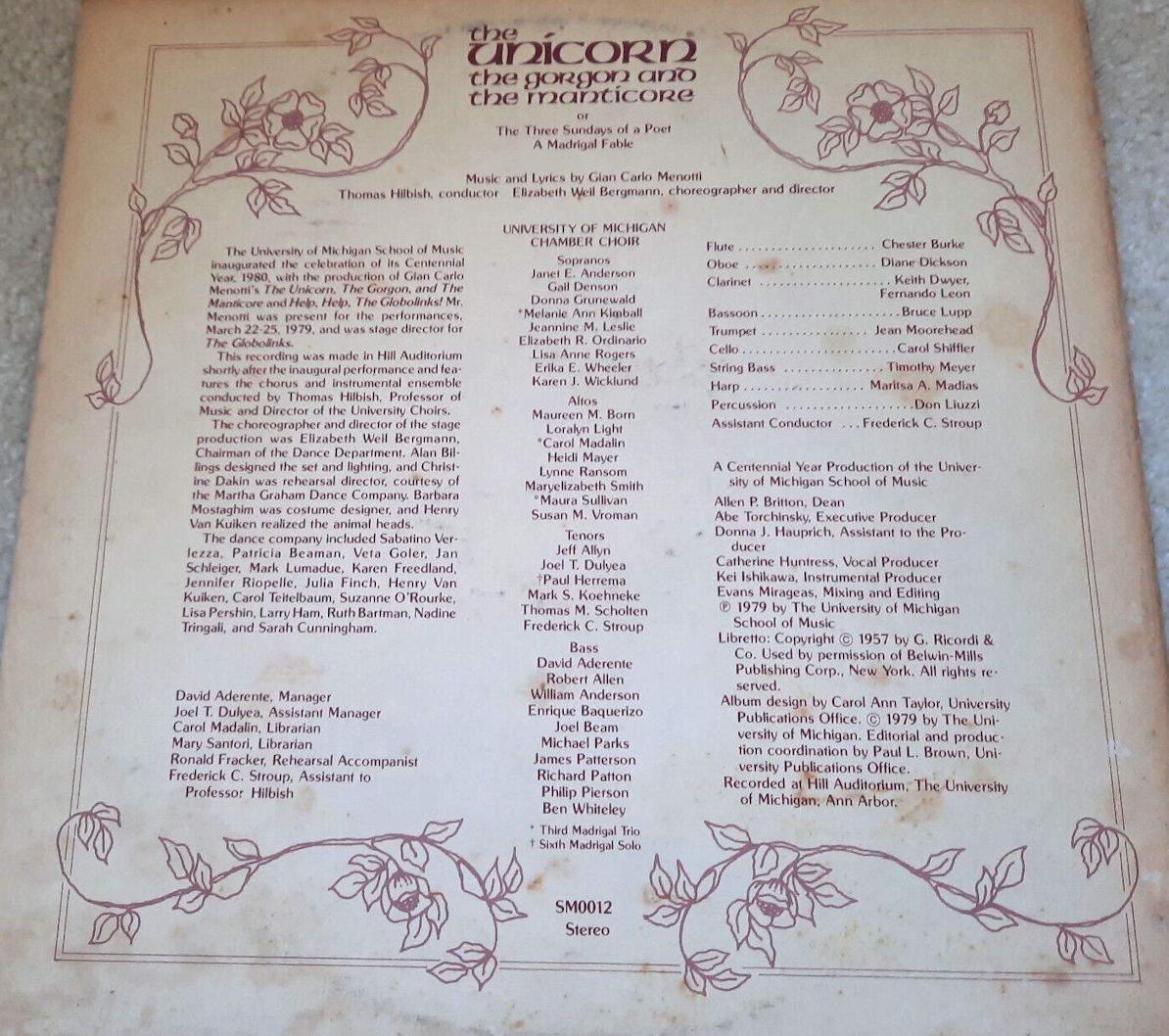Mezzo - Soprano Carol Madalin
A Conversation with Bruce Duffie

Mezzo-soprano Carol Madalin may not be a well-known name, but she has performed
operas and concerts both in Europe and the U.S. Her most notable accomplishment
could very well be what brought us together. We discuss the circumstances
at the end of this interview, but suffice it to say that the recording she
had made of music of Respighi and Martucci gave her both notoriety and satisfaction.
We met at the end of June of 1994, and as we were setting up to record
our conversation, we spoke of recordings . . . . .
Bruce Duffie: Since we’re talking about recordings,
let me ask how you happened to decide to record some music of Martucci
[CD shown below-left].
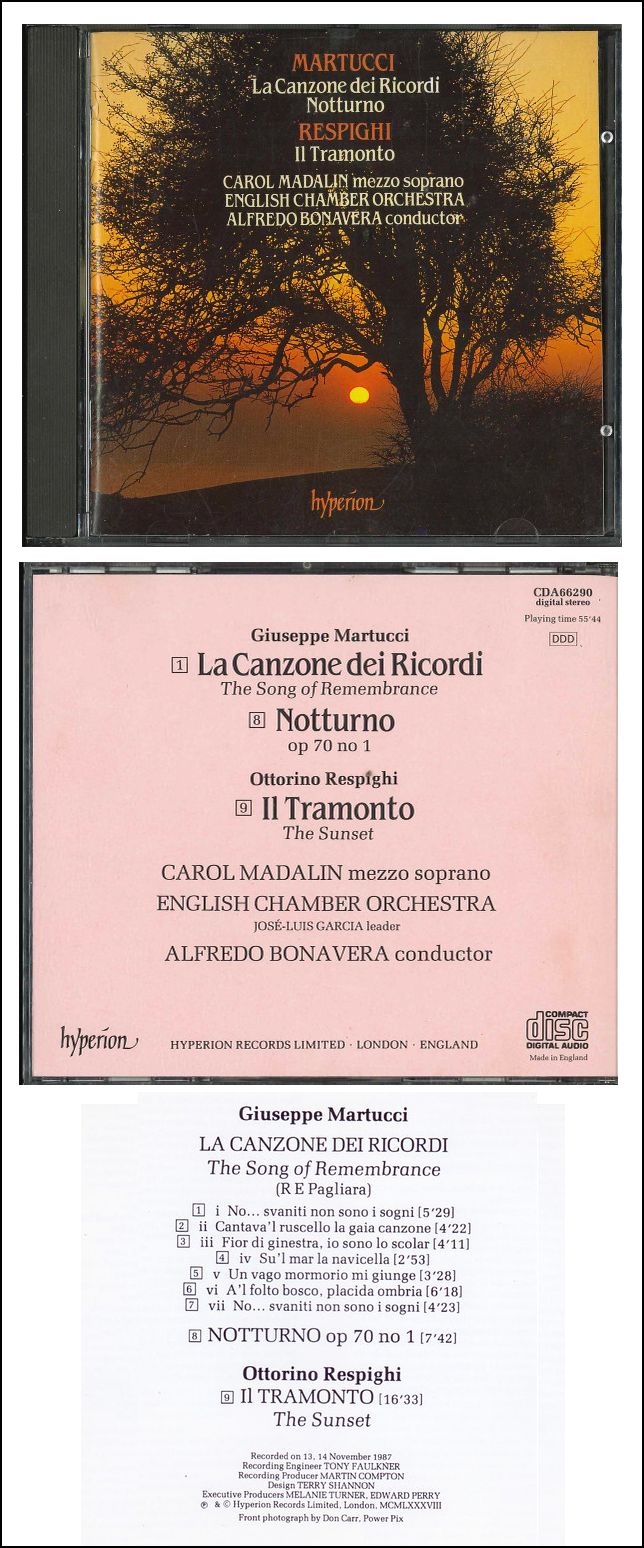
Carol Madalin: That was interesting.
I was auditioning for Glimmerglass Opera, and there was a young conductor
there named Alfredo Bonavera. He was at the audition, which went
well, and everything was fine. I was staying in New York because
it was one of those gimmicks where you had to stay over a Saturday night
to get the good airfare. [Both laugh] I got a phone call
from my manager who said that the conductor who was there wanted to hear
me for something else. I asked what kind of music, and she said
he wanted to hear art-songs. I didn’t have any music with me except
what I was bringing for the auditions, which was a role in one of the
operas for the season at Glimmerglass. So I was scurrying around.
I called up Patelson’s [the famous sheet music store across from
Carnegie Hall, which closed in 2009]. I also called a couple of
other friends, and asked if they could help me out, as I had nothing.
So I got some music from them. I just happened to be staying at
a friend’s apartment, and the audition took place in that apartment because
they had a studio with a piano. The conductor came over, and I
sang. I had my accompanist there, and at first, I wasn’t even sure
what this was all about. My manager said that he
was making a recording. [Laughs]
To say I was skeptical would be an understatement, but I auditioned
for him, and he seemed very pleased. He then wanted to hear some
more Italian, and he proceeded to tell me what the music was. It
was the Martucci songs, and Il Tramonto of Respighi. He
said he was making a recording in London, and, “They
have a singer for me, and I don’t like her. I heard you yesterday,
and I love your voice, and I want you to do this.”
I still just didn’t believe it...
BD: “I will make
you a star!”
Madalin: [Laughs] That’s right!
Then I asked him what the time frame was. This was early October,
and he said it was the first two weeks in November. I was just
looking at the score for the first time, and so the whole proposition
was a little overwhelming. Then there was the problem about working
in Great Britain. There’s a real fine line about it. You
have to be an international singer, and you have to have worked on
different continents. I didn’t know anything about this.
So, I went home, and got a call from my manager. She said, “He
wants to use you with the English Chamber Orchestra. They’re a
wonderful orchestra, and they make all sorts of recordings.”
We tried several different angles of how to get me over there, and finally
decided that I was to be paid indirectly through the man who was sponsoring
the recordings, and who was putting the money up front.
BD: Then you weren’t actually working over
there?
Madalin: No. I wasn’t really forthcoming
about it when I went through customs as to why I was there, because
I didn’t want to start all that, and have them say I couldn’t do this.
I simply said I was visiting.
BD: Customs is not the kind of thing
you think about when you’re vocalizing.
Madalin: No, and I really couldn’t be bothered
with all that. I had so much to do just to learn the music, because
it was new pieces. The Martucci is a long piece. It’s very
involved and somewhat dramatic, and then there was Il Tramonto.
There was no recording of the Martucci. I could listen to a recording
of Il Tramonto, and I don’t like to listen to someone else’s interpretation.
It’s fine after you’ve worked on the piece for a while, and you figure
out what it means, and how you want to do things. Then you can hear
somebody else and say whether you like that, or don’t like that.
But if you listen to someone else’s interpretation for the very first time,
it’s very hard not to have it color your perception of it.
BD: I’m glad you didn’t use that just to cram
it into your mind.
Madalin: Oh, no, no, and so I worked really
hard, and I took a week, and went to New York. Fortunately, the
pianist that I was working with had performed these songs before with another
singer, so he was very familiar with them. That was really a saving
grace. Just a week before I was ready to go over to London, I thought
this is never going to come together. There is so much more that
I could with this. I felt just a little overwhelmed, because to
learn something that quickly, and to put my stamp on it, really does take
time. It’s wonderful to learn a piece of music, and then put it
away for a while, because when you bring it out again, it just matures
all on its own without you even looking at it. I don’t know if it’s
a subconscious thing, but there’s always some added dimension that comes
back when you put it away for a while. But I really didn’t have the opportunity
to do this. I could only put it away for a couple of days.
BD: That was not enough time for it to steep.
Madalin: No, it’s not. [Both laugh]
BD: I assume it all did come together.
Madalin: It did. I was so naïve when
I went in there. The only recording that I had done was with my
college. We recorded The Unicorn, the Gorgon, and the Manticore
of Menotti [LP
shown below-right]. I had done one part of the trio, but I
just remember we were all standing around and trying to be quiet a lot.
I had no clue as to the whole process. When I got to London,
there was this professional well-put-together orchestra, and all they
knew is that this conductor was coming in, and he was bringing his American
singer with him. I found out later that they were all ready just
to put me on a chopping block. Then I opened my mouth to sing, and
they changed their minds immediately! They said, “Where
did you find her?” So, I was happy about
that.
BD: You were a true discovery.
Madalin: I’m glad I didn’t know that beforehand.
There were some things I was naïve about, because it would have
all frazzled me a bit.
BD: It’s nice to know that you got up there,
and proved yourself immediately.
Madalin: Yes. I don’t know if you’ve
been in London in November, but it was very damp. We recorded
this in an old stone chapel, not in a studio. There was no little
booth that I stood in with headphones. We were all doing it together
and we had two days to do it all. He spent much of the first day on
the Martucci piece that is just the solo orchestra. That’s the thing
he wanted to start with, and I was just standing in the back, pacing, and
wondering if I was ever going to get to do my part. I knew we just
didn’t have that much time, so finally when I got to sing, it was such
a relief. We rehearsed each piece before we recorded it, and they
wanted to hear me, so I would turn around to the orchestra, and sing to them.
Then we would work out a few things, and I would turn back to the front
when we did the recording. Had I been a seasoned person who does
lots of recordings, I would have realized that this was very taxing vocally.
BD: You shouldn’t sing full-out in rehearsals,
and then sing full-out for the recording.
Madalin: Right, exactly. The second
day I realized that, because I could feel that my voice was getting
tired! In opera rehearsals, unless it’s a dress rehearsal they
never expect you to sing full-out.
BD: Sure. You have to ‘mark’.
Madalin: That’s right. I was so excited
about singing it, and it was so exciting. It was wonderful to finally
hear it with the orchestra, because the orchestration is really special,
especially in the Martucci. I just wanted to sing, and had I been
a little smarter, I would have saved my voice just a bit. The recording
engineer, whose name was Martin Compton, was just a special person. He
was very sensitive, and was really concerned about my welfare. So
he would come up to me in private and he’d say, “Now Carol,
I think you can do that a little better this time, because this
note wasn’t quite the same tone.”
BD: He was being helpful?
Madalin: He was wonderful, because the conductor,
Alfredo Bonavera, had so much going on. He was so concerned and
so involved with the orchestra, and I felt like Martin was really on
my side. He was listening to me, and making sure that I was at
my best, even though he didn’t know me. We had just met. During
the breaks he’d ask me if I wanted to hear some of what we had just recorded.
It was such a wonderful experience because of him. Before we
left London, he gave me the copy of the recording. It wasn’t the
master. It wasn’t the finished product, but it was what he thought
was the best material. My mother was with me, and he had us over
to listen to the recording. We had tea, and it just so happened that
it was my birthday. It couldn’t have been a nicer birthday present
to hear what we had done just a few days before.
BD: Are you pleased with the end-product that
has been issued?
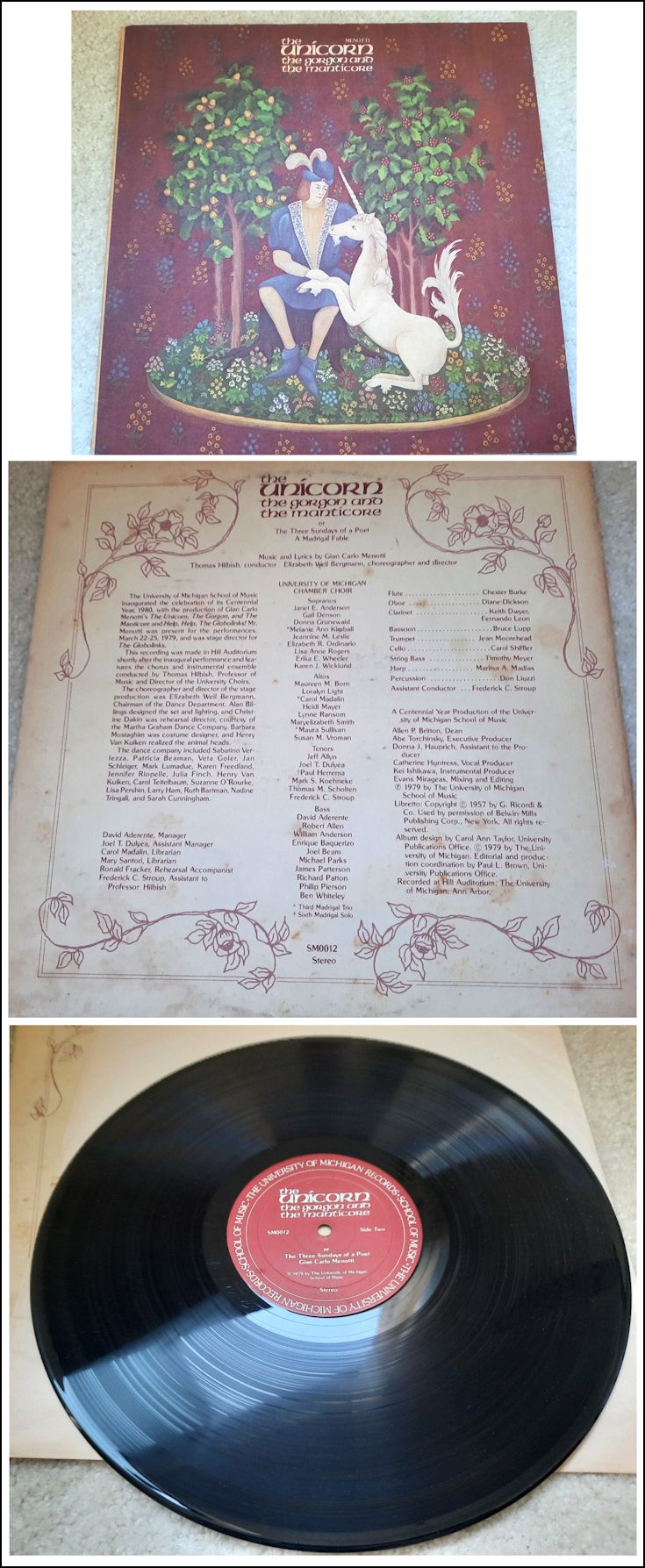
Madalin: Yes, I am. We did a lot of
takes at the beginning of Il Tramonto, and there was one where
I had a frog in my throat. I had to clear my throat, but I kept
singing. This is one thing I also learned. If you have a
problem, or if you make a mistake, you have to stop, because if you don’t,
and you keep going, the tape keeps going and they can use that. In
the Respighi, anytime one of the strings made a mistake, the whole process
stopped. They made sure that it did, [Both laugh] You
learn a lot from previous experience.
BD: I trust they didn’t use that take with
the frog in your throat...
Madalin: When Martin and I were listening
to it, I said, “Oh, no!”
He asked what it was, and that was the take when I had the frog in my
throat. He said “Yes, but even though you
have that, the mood that you’re creating was so special that I really
wanted to use it.” I decided to leave it
up to their judgment if they think if it’s more magical. The beginning
of that piece is very exposed, and it really sets up the whole story
for the piece. I will just get over the fact that there’s one note
I have a frog in my throat. It was really just one note, and it
was just for a short time on that note. But being a singer, I could
hear it. [Laughs]
BD: You knew it was there, so you’re anticipating
it. But no one else will know it.
Madalin: No, and when the recording came out,
there was no frog! [Has a huge laugh]
BD: There you are!
Madalin: It was very interesting that it was
coming out on cassette and compact disc, because that was about the
time that Hyperion was totally phasing out vinyl records. I was
really surprised. I was talking to one of the mangers of Hyperion,
and he was very pleased with the whole recording. He said that he
could see within a year or two that it will all be CDs...
BD: ...and he was right! [Vis-à-vis
the recording shown at right, a larger size image of the back cover can
be seen at the bottom of this webpage. Note that Madalin is also a
librarian for the group!]
Madalin: He was so right. My father
bought the CD, and then he had to go out and buy the CD player!
BD: Was that manager Ted Perry?
Madalin: Yes.
BD: He blew through town several years ago,
and I did an interview with him marking twenty years of Hyperion recordings.
He was a very nice fellow.
Madalin: Yes, very nice. We had a Guinness
stout in a pub together.
BD: So, the dangerous question... Why
haven’t they asked you to make more records?
Madalin: I would love to go back and work with
them. The English Chamber Orchestra called me a year later, and wanted
me to come and perform. They wanted me to do some Haydn, and things
were in the works to start that ball rolling. I was so excited. They
said it was going to be in the Royal Festival Hall, but unfortunately
what happened was the whole status of working and being intercontinental.
I was still just a North American performer. That’s how they
label it. There are all sorts of stipulations, and that’s what held
it up because it just didn’t materialize. I was really disappointed.
Ted Perry liked me very much, and there was a man who was Swiss who
was financing this recording, because he was friends with the conductor.
Bonavera had said this music must be recorded. It’s very important,
and this is what he wanted to do. Making recordings is a tricky thing.
I really admire the Hyperion label because they do have some unique
pieces, and they don’t really seem to care necessarily about keeping it
mainstream. As for my own career right now, I need to make those
contacts again, because I did it all through Ted Perry. He brought
me into it, but when you make a contact like that, you have to pursue it.
He liked me, and he wanted me to do other things. He was very
proud of how the whole thing came out, and he was also pleased with the professional
way I handled myself during the recording. The first day we never
had to stop because of a mistake that I made. It was always someone
else. The second day, on the very first take I said a wrong word,
so we had to stop. Then for about ten minutes I was nervous. On
the first day there wasn’t a nerve in my body. It was such a wonderful
experience to do this recording, and to hear this music. Then, on
the second day it kind of caught up with me. Then I pulled it back
together, and all was fine.
BD: Now that you’ve made this recording, have
you tried to get other live performances of these pieces?
Madalin: I tried that when I came back, especially
on a local level. I was really trying to get some of these symphony
orchestras that are in the area. I met a conductor of one of
the Chicago area symphony orchestras, and I told him that there are these
great pieces, and I had recorded them, and he really had to listen to
them. But it’s a matter of familiarity. People have never heard
of this music. They don’t know the history, and they’re not really
sure what it’s all about. Also, it can be a problem getting a singer
to be the soloist. The whole piece is one-singer-with-orchestra,
and that overwhelms a few conductors as far as programming, and putting
it in their series.
BD: Has this encouraged you to do more art-songs,
as opposed to opera?
Madalin: Oh, absolutely. I always felt there
were some connections with the art-song, because, as a lyric mezzo,
the roles that I have in opera are not always the most exciting.
Rosina is definitely something that’s wonderful, and I would perform
that wherever. But a lot of the stuff I was singing, and that I
was being considered for, was just not that satisfying. It was
fun, and I enjoyed Stéphano in Gounod’s Romeo and Juliet,
especially doing my sword fight. I had a good time, but musically
it’s not that challenging. There’s not a
lot of levels to being a page, or even portraying Dorabella [in Così
fan Tutte]. As much as I love her, she doesn’t have a whole lot
of depth to her soul. With art-song I did the Schumann Frauenliebe
und Leben for the women’s group that I’m involved with, the Musicians
Club of Women. [Musicians Club of Women is dedicated to creating
a vibrant classical music community in Chicago. Founded in 1875, MCW
is one of the oldest musical organizations in Chicago, continuously supporting
emerging and established women musicians through scholarships and performance
opportunities.] I specifically wanted to do that for
the ladies (as I call them), because it’s a wonderful piece. The whole
cycle goes through the life of an adult woman, from the time she sees this
man, to him talking to her, to her realizing that this man has chosen her,
to their wedding, to the fact that she has a child with him. Then
it takes a big step when he finally is no longer in her life because he has
died, and she’s all alone. There’s something really special about
singing a whole cycle like this Schumann, or the Martucci, because you
have the start, the middle, and the finish. It’s a complete work,
and it flows. Each song is in a key which is related to the others,
and it’s so wonderful to be able to do the whole thing. That’s why
I wanted to do it. I didn’t do that for the performance in the public
library. I really wasn’t sure that their Cultural Center was ready
for that particular piece. [To see photos of the Chicago Cultural
Center in the former Chicago Public Library, click HERE.]
It’s different if you perform a whole recital, just yourself, and
you can program that piece.
BD: This was half a recital?
Madalin: Right, right.
BD: I hope you get asked back so you can do
more of these things.
Madalin: Yes. With regards to the Cultural
Center, they usually split it up between two or three performers. The
Dame Myra Hess concerts usually have two different artists, and the
Award Winners in Concert is also two different artists. But it’s
a rare opportunity to be able to perform art-songs. The genre
is so huge, and there are so many wonderful composers, and even more contemporary
composers.
BD: With the vast array of items to choose
from, how do you select them, and form a program?
Madalin: [Laughs] That’s a good question!
I have so much music at home, and I literally just flip through it and
see what I love. I have just started working on the Elgar Sea
Pictures. I did two of those at the library, and I would
love the opportunity to do that whole cycle. I just think it’s
wonderful. One time when I was on the road, I heard Marilyn Horne perform those,
and I thought these are really wonderful songs! So, I would like
to do the complete set, and also Les Nuits d’Été
of Berlioz. The first person I heard was sing that was Janet Baker.
Except for some American music, I’ll hear recordings and something
will speak to me. I’ll hear a song and I’ll think that I really want
to hear the rest of it. Or I’ll wonder if
there’s more to it than just the one song. In college, we always
tried to explore. If it was a song cycle, we always tried to explore
the poet and the whole cycle.
* * *
* *
BD: Now you’ve taken a couple of years off, and
had a family and a couple of children. Is it good now to be getting
back into this whole routine, and maybe going back out on the road?
Madalin: [Laughs] Just this past Monday,
I said to my accompanist that when we finally get to the Cultural Center,
then it’s going to be easy, because it’s a madhouse before that.
My three-year-old can just tell when Mommy is about to perform, because
the tension level gets high, and she feels it, even though she can’t
quite comprehend what it’s all about. But it’s a good time now
to get my career going again, since I’ve had the family and the children...
BD: [With mock horror] But you can’t
just put them aside!
Madalin: [Laughs] No, but my plan of action
here is not necessarily opera, because usually opera is a big time commitment.
But I really want to explore the concert avenue, because there are
times where you go in to the city in which you’re performing, you have
two rehearsals, usually one rehearsal with the conductor and just the
singers, then one with the orchestra. It depends on the organization,
but then there is the performance. So it’s generally a four-day commitment.
You have to know your music when you come, and it is all very satisfying.
I did the Beethoven Missa Solemnis when I was pregnant with my
first child, and it was just a wonderful experience. It is wonderful
music, especially to perform it with the orchestra and chorus. So
I’m really looking at that avenue to get myself back in. In this
country, it’s very hard to be a concert singer, so I’m going to have to
find people to ask what’s the best way to pursue this. There have
been people who do this. Janet Baker is one. She did a lot
of concert work, and she got into opera a little bit later. Also,
Jessye Norman and Kathleen Ferrier did a lot of concert work, oratorio,
and recitals. Then when people’s ears perked up, they said they’d
love to hear that singer in an opera!
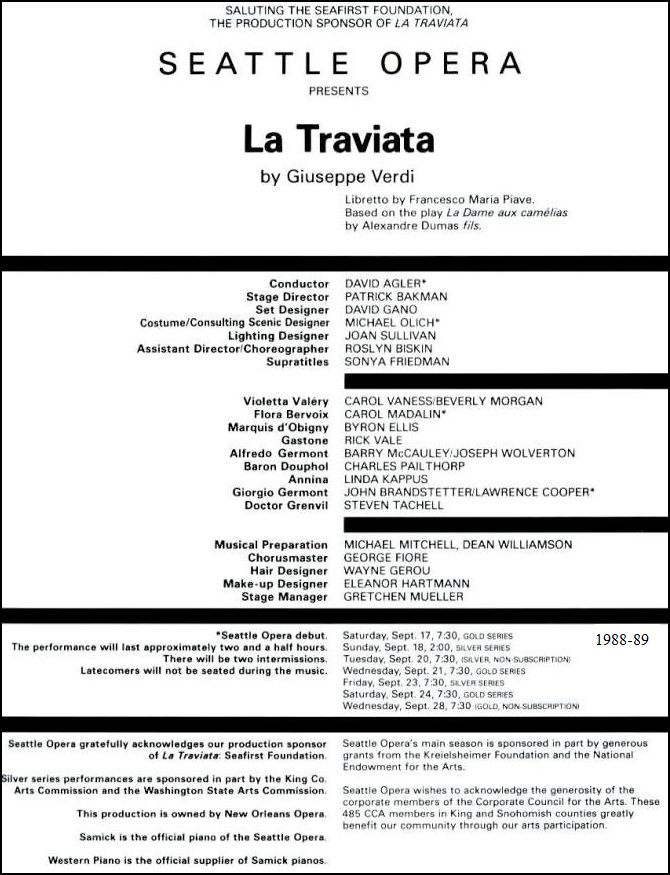
BD: So, you’ll have roles like Orfeo
and a few other things ready, but do the art-songs first?
Madalin: Yes. There is wonderful concert
repertoire, with lots of Mozart concert arias, and Haydn, and other items.
These are things which need be explored.
BD: No matter what the work, is singing fun? [Vis-à-vis
the program shown at left, see my interviews with Patrick Bakman, Carol Vaness, and Barry McCauley.]
Madalin: Oh, it’s great fun. [Laughs]
Yesterday I was telling somebody about this. You stand up there
and pour your heart out. The first time I sang at the Cultural Center,
there were people who were asleep. You think that people are just
not paying attention. They’re not listening. They don’t care.
Then there’s that one person who comes up to you afterwards and says
that you touched their soul when you sang! It’s just such a great
feeling. It’s hard to describe. I just
want to thank that person for understanding what I’m trying to do here,
and what this is all about. That’s happened a number of times. It’s
funny, because sometimes it happens when I feel like it was really awful!
Then someone comes up and says that it was just so special! Sometimes
people are so overwhelmed. Maybe it’s the quality of my voice, or
something that they hear or feel that I’m expressing or sharing. It’s
almost embarrassing. It’s like they know something
about me, and I can’t figure out how they know.
BD: In a way, when you’re standing up there
singing, you’re baring your soul for them.
Madalin: Yes, definitely. There’s some music
that just speaks so strongly. The Verdi Requiem is just such
a piece. Every time I sing that, there’s something else to be discovered.
Even though Verdi was a professed atheist, there is still something
that comes through in that music, and it speaks to millions of people.
It didn’t matter what he believed, or what he felt personally, and
that’s exciting. That’s the thing which makes it all worthwhile.
It’s not always whether the critic is going to like me. A
lot of people lose sight of that. I know a lot of really successful
singers that become jaded because they lose sight of what it’s really
all about, and that’s just music. Music can cross any barriers.
Music can speak to people in any language. It doesn’t matter if
you even have the same beliefs, or even if you’re on the same side.
It’s just not important. Music can, as they say ‘soothe a savage
beast!’ [William
Congreve (1670-1729) is famous for the line ‘Music
hath charms to soothe a savage breast’, which he wrote in his 1697 play,
The Mourning Bride.
While
often misquoted as ‘Music hath charms to soothe a savage
beast’, the original quote refers to the
power of music to calm a wild or angry heart.]
But it can provide much more, and I just feel it’s so important
to have that in our lives. I want my children to appreciate all music,
not just the music that I like. They should find something worthwhile
in all music and the arts, because it removes us from our little selves
so that we see the bigger picture. That’s what it really is for me,
and sometimes it’s just so much fun. On Monday, the last piece I sang
was Una voce poco fa [Barber of Seville], and I thought I
should just do it and have fun with it. I knew that the audience could
tell. They can see that. It’s so wonderful to be able to stand
up there and feel that confidence in my ability to make it fun for them,
and to show them that even though they might not like classical music, this
is fun, even though they don’t know what I’m singing about because it’s in
Italian. One of my neighbors who works downtown came up afterwards.
She’s not an opera fan, but she said she really believes that opera
should be sung in the original language, because even though she didn’t
know what I was singing about, she had so much fun! She could just
tell from the gestures and the inflections in the voice what it was all
about.
BD: I’m glad you are the possessor of a voice than
people enjoy hearing, and also have the intelligence to do something
with that voice. It’s quite a combination.
Madalin: Yes, it is. The instrument is just
unbelievable, and yet as far as doing something with music or saying
something with music, that’s really it, because that’s not something
people can teach you. Coaches say to do this or do that, or sing
it this way, but it’s just like the great actors of our time. If
they don’t put something of themselves into it, then there’s really not
much that gets communicated. You have to be willing to put yourself
out there, and there is a great deal of vulnerability. Sometimes it’s
a little scary, but...
BD: Thank you for being willing.
Madalin: You’re welcome!
BD: It’s been nice to chat with you. I’ve
admired this recording for a long time...
Madalin: Oh, thank you.
BD: ...and I had no idea that you were living
amongst us! You’re going to remain with the Chicago area as your
base?
Madalin: Yes. It’s a really great place to
be, and there are a lot of opportunities here. I have yet to partake
of some of them, but I’d like to, and it’s a good jumping off point. There’s
a lot of work in the Midwest, and it’s easy to get to both coasts. Plus,
it’s a wonderful place to raise a family.
BD: Yes. Never lose sight of that.
Madalin: Right, absolutely. They won’t
let me! [Much laughter] My second daughter is enchanted with
singing. She just loves it. She just goes, “Ooo,”
and, “Ahhh,” so she’ll be
the easier one to get to accept my career.
BD: Your hubby is supportive of all this?
Madalin: Oh, absolutely! Sometimes he’s
actually a little anxious for me to get back and do it. He’s probably
my biggest fan, and my best critic, because he really believes in me.
That makes a big difference.
BD: What’s next on the calendar?
Madalin: I’m doing a Messiah in Corpus Christi,
Texas, but that’s not until the fall. Last fall, when all the auditions
were taking place, I was having a baby, so I’m going to miss a whole season.
People don’t know that I have to get my name out again now, and let
them know I’m back on the circuit. Then in the fall I have to
make some trips to New York, and also do some auditions just to let people
know that I’m available again.
BD: I hope it all works out well for you.
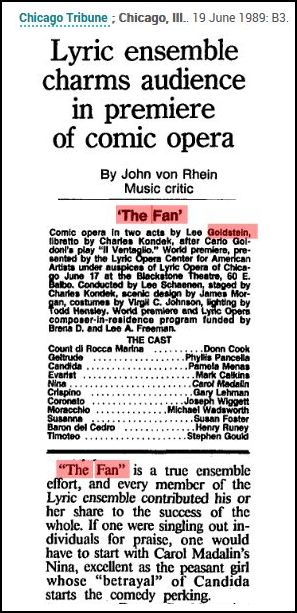
Madalin: Yes, thank you!
BD: It’s so funny the way this came about...
I was playing your recording, and had jotted a note to get your contact
info, so that I might be able to catch you when you came to town. The
note was sitting on my desk, and all of a sudden I get a call from you!
Madalin: It was just pure chance that I happened
to hear it. Initially I heard the music, and wasn’t sure... I
thought it sounded familiar, and then like a flash I realized it was me!
[Both have a huge laugh] So, it was quite a pleasant surprise
to hear it, and then to be able to have a follow up. I certainly
appreciate you putting that in your program.
BD: When you were doing Stéphano [Romeo and
Juliet of Gounod with Chicago Opera Theater
in 1989, featuring Gregory
Kunde (who had also been a member of the Lyric Opera Center), conducted
by Mark Flint, and staged
by Dominic Missimi],
I wanted to set up an interview, but for some reason, it just didn’t work
out. I remember seeing the performance, which I enjoyed very much,
and then I figured you would be off to another engagement.
Madalin: Yes. Earlier I was with
the Lyric Opera Center, and after that they did the world premiere of Lee Goldstein’s
opera The Fan [part of a review is shown at right]. They
needed a lyric mezzo, and they wanted to use me because I was a former
student.
BD: How long had you been in the Lyric Center?
Madalin: I was there for two years, 1981 and
1982. That’s when I first came to Chicago. Then I was gone for
the next three years. I auditioned for Carol Fox [General Director
of Lyric Opera], but by the time I got to Chicago to start the program,
she was gone. My first year was also the first year for Ardis Krainik [who
succeeded Fox].
BD: Where are you from originally?
Madalin: From Michigan, from the Detroit area.
So, I am a Midwest girl. After I had been in Chicago, they
wanted me to come back for The Fan, and it was a wonderful experience
doing that.
BD: I enjoyed that opera very much.
Madalin: It was fun.
BD: It was a great shock when Goldstein died.
Madalin: I was devastated. I was in
Washington covering a role of Tina in The Aspern Papers [by Dominick Argento. The
role was created by Frederica
von Stade, and the 1987 premiere was telecast on PBS. Also in the
cast were Elisabeth
Söderström, Neil Rosenshein, Richard Stilwell, and
Eric Halfvarson.]
Argento was a friend of Lee’s teacher. Lee and I were kind of buddies.
I used to see him on the street occasionally (on Broadway!), and we would
talk. He said he had sent a manuscript, a score, to Lake George, and
they were thinking about it! It was all very exciting for him.
I told him that if he wanted to a make a recording, I’d be happy to do my
role again. When I heard he had passed away, it was such a shock because
he had such talent and wit.
BD: I’m glad that you’re doing some music by living
composers.
Madalin: It’s fun. I did Argento’s Postcard
from Morocco, which is a real challenge, but what a piece! When
I was understudying the role of Tina, that music just really touched me.
There’s just something special about his music and particularly that piece.
BD: Thanks for coming in tonight.
I appreciate it very much.
Madalin: You’re welcome. Thank you for
having me.
© 1994 Bruce Duffie
This conversation was recorded in Chicago on June 30, 1994.
Portions were broadcast on WNIB the following November.
This transcription was made
in 2025, and posted on this website
at that time. My
thanks to British soprano Una Barry for
her help in preparing this website
presentation.
To see a full list (with links) of interviews which have been transcribed
and posted on this
website, click here.
To read my thoughts
on editing these interviews for print,
as well as a few other interesting observations,
click here.
* * * *
*
Award -
winning broadcaster
Bruce Duffie was with WNIB,
Classical 97 in
Chicago from 1975 until
its final moment as a classical
station in February of 2001.
His interviews have also appeared
in various magazines and journals since
1980, and he continued his broadcast series
on WNUR-FM,
as well as on Contemporary
Classical Internet Radio.
You are invited
to visit his website
for more information
about his work, including
selected transcripts of other
interviews, plus a full list of
his guests. He would also like to
call your attention to the photos
and information about his grandfather,
who was a pioneer in the
automotive field more than a century ago.
You may also send
him E-Mail with
comments,
questions and suggestions.






